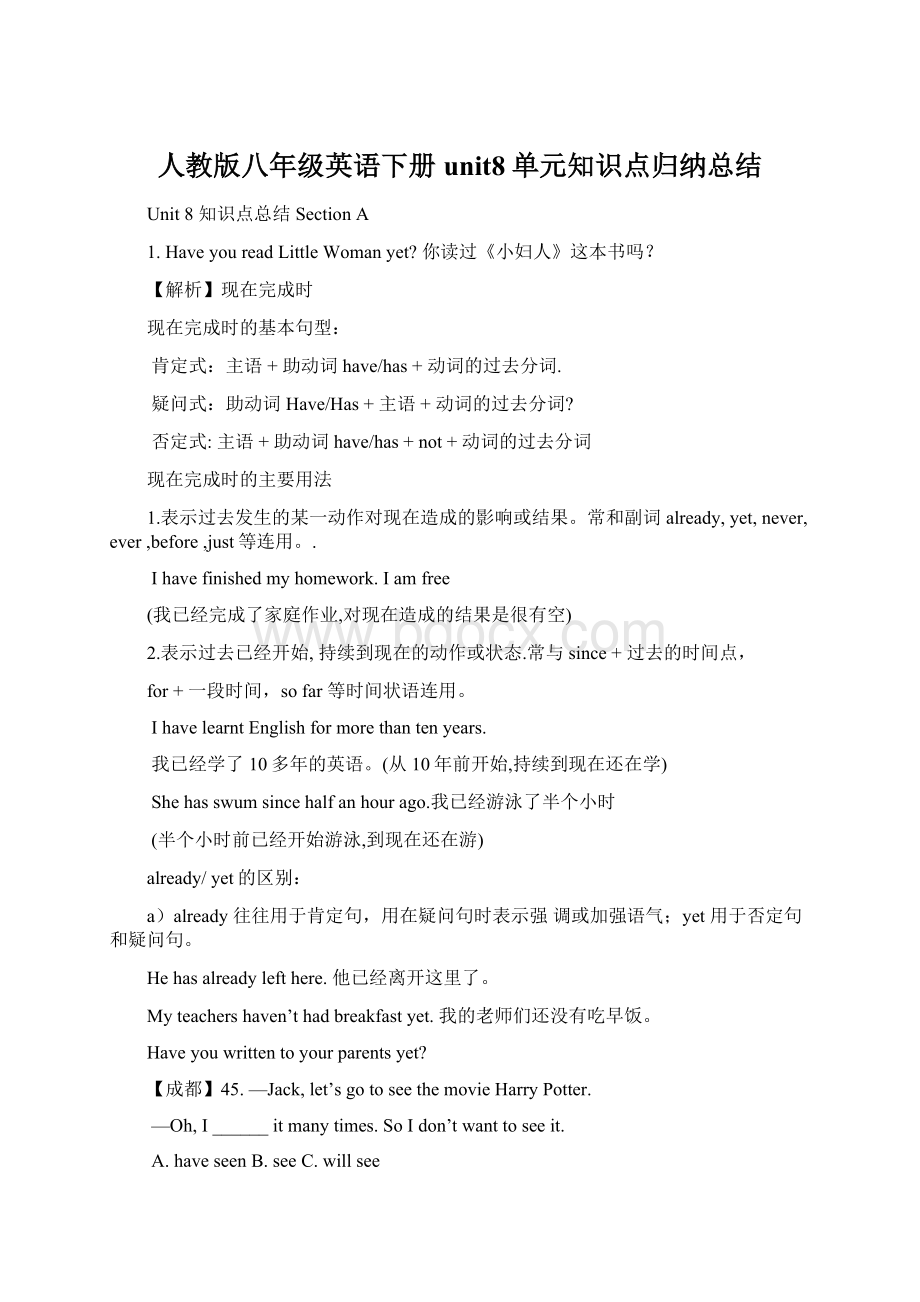人教版八年级英语下册unit8单元知识点归纳总结.docx
《人教版八年级英语下册unit8单元知识点归纳总结.docx》由会员分享,可在线阅读,更多相关《人教版八年级英语下册unit8单元知识点归纳总结.docx(15页珍藏版)》请在冰豆网上搜索。

人教版八年级英语下册unit8单元知识点归纳总结
Unit8知识点总结SectionA
1.HaveyoureadLittleWomanyet?
你读过《小妇人》这本书吗?
【解析】现在完成时
现在完成时的基本句型:
肯定式:
主语+助动词have/has+动词的过去分词.
疑问式:
助动词Have/Has+主语+动词的过去分词?
否定式:
主语+助动词have/has+not+动词的过去分词
现在完成时的主要用法
1.表示过去发生的某一动作对现在造成的影响或结果。
常和副词already,yet,never,ever,before,just等连用。
.
Ihavefinishedmyhomework.Iamfree
(我已经完成了家庭作业,对现在造成的结果是很有空)
2.表示过去已经开始,持续到现在的动作或状态.常与since+过去的时间点,
for+一段时间,sofar等时间状语连用。
IhavelearntEnglishformorethantenyears.
我已经学了10多年的英语。
(从10年前开始,持续到现在还在学)
Shehasswumsincehalfanhourago.我已经游泳了半个小时
(半个小时前已经开始游泳,到现在还在游)
already/yet的区别:
a)already往往用于肯定句,用在疑问句时表示强调或加强语气;yet用于否定句和疑问句。
Hehasalreadylefthere.他已经离开这里了。
Myteachershaven’thadbreakfastyet.我的老师们还没有吃早饭。
Haveyouwrittentoyourparentsyet?
【成都】45.—Jack,let’sgotoseethemovieHarryPotter.
—Oh,I______itmanytimes.SoIdon’twanttoseeit.
A.haveseenB.seeC.willsee
【广】33.—Whydon’tyougotothemoviewithme,Betty?
—BecauseI______itbefore.
A.sawB.haveseenC.see
2.What’sitlike?
它怎么样?
【解析】某物怎么样?
What’s+物+like?
How+be+物?
某人怎么样?
What’s+人+like?
用来提问人的性格
Whatdo/does+人+looklike?
用来提问人的外表。
【黑龙江齐齐哈尔】—WhatdoesAnnalooklike?
—_________.
A.She’skindB.She’stallC.Shelikesskating
3.OliverTwistisaboutaboywhowentouttoseaandfoundanIslandfulloftreasures.《雾都孤儿》讲的是一个小男孩出海并发现了一个满是珠宝的小岛的故事。
【解析】fullof充满befullof=befilledwith充满
【山东莱芜】Ifyoureadalot,yourlifewillbefull___pleasure.A.byB.ofC.forD.with
4.It’saboutfoursistersgrowingup.它讲述的是四个姐妹的成长故事。
【解析】growup长大;成长IgrewupinBeijing.
growinto长大成为Marygrewintoabeautifulgirl.
5.Youshouldhurryup.你得快点。
【解析】hurryup赶快;急忙(做某事)
(用在口语中,用来催促别人快走)
in a hurry匆忙地hurrytodosth匆忙去做hurryoff匆忙离开I'minahurry.我很赶。
6.Thebookreportisdueintwoweeks.读书报告两周后就要到期了。
【解析1】dueadj.预期;预定,通常只用作表语。
beduetodosth预期做某事
YouareduetohandinyourcompositiononFridayafternoon.
【解析2】intwoweeks“两周之后”,in意为“在......以后”,
“in+一段时间”用在一般将来时的句子中,意为“在......(时间)后”。
Hewillbebackinaweek.一周之后,他将回来。
【注意】:
after常用在一般过去式的句子中。
HegottoBeijingaftertwohours.他是两个下时候到北京的。
7.WhenIfirstarrivedonthisisland,Ihadnothing.
当我第一次到这个岛上的时候,我一无所有。
【解析】nothing没有什么;没有东西
用法:
(1)不定代词,意为“什么也没有,没有东西”。
相当于not…anything.
Thereisnothinginthefridge.Shehasnothingtodo.
(2)当有修饰词来修饰nothing等不定代词时,要放在不定代词后面。
修饰词可以是形容词、动词不定式等。
Iwantsomethingtodrink.Ihavenothingspecialtotellyou.
(3)在英语中,不定代词有:
somethinganythingeverything
everyoneeverybodysomeone
anyonesomebodyanybody
noonenothingnobody
Wouldyoulike___________(吃的东西)?
【北京4】---Tom,supperisready.
----Idon'twanttoeat____________,Mum.I'mnotfeelingwell.
A.everythingB.nothingC.somethingD.anything
【莱芜3】Asmilecosts________,butgivessomuch.
A.somethingB.anythingC.nothingD.everything
8.I’vebroughtbackmanythingsIcanuse— foodanddrink,tools,knivesandguns.
我带回许多我能用的东西——食物、饮料、工具、刀和枪、
【解析】bring带来【辨析】fetch/bring/take
(1)fetchv去拿来=get去(某地)拿来(讲话者处)
(2)bring(brought,brought)v带来从(某地)拿到(讲话者处)
bringup养育,养大
bringsb.sth=bringsthtosb.给某人带某物
(3)takev带来从(讲话者)拿走take→took→taken
【短语】takecare小心takechargeof负责,看管
takeholdof握住takeoff脱下takeout取出
takealook看一看takeaway拿走takeexercise做运动
takeiteasy不紧张takeone’stime从容不迫
()①—Oh,I’veleftmyschoolbagintheclassroom.—Don’tworry.I’ll___itforyou.
A.bringB.getC.carryD.take
()②Theteachertoldthestudents____anyfoodintotheclassroom.
A.nottobringB.notbringC.don’tbringD.tobringnot
()③—Don’tforget____yourhistoryandpoliticsbookstomorrowmorning.
A.bringB.tobringC.bringing
【湖北荆州】—Sam,myiPhoneisinmybedroom.Couldyou___itforme?
—Noproblem.
A.bringB.fetchC.takeD.carry
【浙江】—I’veleftmykeysinthemeetingroom.Please___themforme.—Allright.
A.buyB.paintC.washD.fetch
【黑龙江】-I’msorry,MrLi.I______myEnglishhomeworkathome.
-Don’tforget____ittoschooltomorrow.
A.left,tobringB.forgot,totakeC.lost,tobring
9.Whoelseisonmyisland?
是谁在我的岛上?
【解析】else其他的;别的
【辨析】other/else
(1)otheradj.“别的;其他的”修饰n.放名词前作定语。
Ontheotherhand“另一方面”
(2)elseadj.“别的;其他的”放疑问词或不定代词之后。
①.What_____doyouwanttosay?
②.What______thingdoyouwant?
A.otherB.othersC.elseD.till
③.Thereis_______inhishome.
A.othernothingB.nothingotherC.elsenothingD.nothingelse
【娄底2】9.—Whatdidyoudolastnight?
—I_________TVandreadbooks.
A.watchB.watchedC.havewatched
10.Isawsomecannibalstryingtokilltwomenfromabrokenship.
我看见一些食人族正试图杀死来自一艘破船上的两个人。
【解析】seesb.Doingsth看见某人正在做某事
seesb.dosth看见某人做了某事
【黔东南州】WhenIpassedtheclassroom,Iheardagirl____init.
A.singB.losingC.sangD.singing
11.Howlonghavetheybeenhere?
他们来这里多久了。
【解析】havebeen(in)待在某地
have/hasgoneto“到某地去”,说话时该人不在现场,
—WhereisJim?
———吉姆在哪里?
—HehasgonetoEngland.———他去英国了。
(尚未回来)
have/hasbeento“曾经去过某地”,现在已不在那里了,
后可接次数,如once,twice,threetimes等,表示“去过某地几次”,
也可和just,never,ever等连用。
MyfatherhasbeentoBeijingtwice.我父亲去过北京两次。
havebeenin表示“在某地呆了多少时间”,常与时间段状语连用。
IhavebeeninShanghaiforthreeyears.我到上海已有三年了
【江苏常州1】—Whyareyouworried?
—I’mexpectingacallfrommydaughter.She ______Newforthreedays.
A.hasgoneto B.hasbeento C.hasbeenin D.hascomein
【湖北孝感1】—I’dlikeyoutotellmesomethingaboutShenNongjia.
—I’msorry,butneitherJacknorI____there.
A.havebeen B.hadbeenC.havegone D.hasgone
【天津2】—IsTomathome?
—No,he______totown.
A.hasbeen B.hasgone C.goes D.willgo
12.Oneofthemdiedbuttheotherrantowardsmyhouse.
他们中的一个人死了,另一个朝我的房子这边跑过来了。
【解析1】theother另一个
词条
含义
用法
other
泛指其他的人、物
作形容词或代词,其后接名词的复数形式
theother
指两个人或物中的一个
通常用于固定短语one...Theother...中
others
泛指另外几个,其余的
是other的复数形式,在句中作主语、宾语
theothers
其他东西;其余的人们
特指某一范围的“其他的人或物”
another
其他的;再一个;另一个
只能用于三个或更多的人或物
【孝感3】22.Myfamilyhastwodogs.Oneiswhite,________isblack.
A.otherB.anotherC.theotherD.others[来源:
学科网]
【解析2】towardsprep.朝;向;对着(移向某处,只表方向)
go/walktowards...“走向......”drivetowards...“向.....开去”
ShewaswalkingtowardsthetownwhenImether.
【湖北黄冈】Inabasketballmatch,playersmove________(朝向)oneendofthecourtwhilethrowingtheballtoeachother.
【辨析】towards/to
towards
表示“向着某个方向”,没有“到达”之意
to
一般接在come,go,move等动词之后,表示“向、往”,有“到达”之意。
13.InamedhisFridaybecausethatwasthedayImethim.
我给他起名叫“星期五”、因为我是在(星期五)那天遇到了他。
【解析】namev命名
n.名字;名称
adj.位于所修饰的名词之后,“名为......的”=named
【2011甘肃】Thestudent__________(name)WangLinismyexampleinEnglish
learning.
14.Wouldyoulikesomethingtodrink?
你想喝点东西吗?
【解析】Wouldyoulike…?
一、wouldlike“想要、愿意”,=want意思接近,
比want语气委婉、客气。
后接名词、代词宾格或动词不定式。
其中would是情态动词,常可缩写为’d
Lucywouldlikesomeeggs.露茜想要一些鸡蛋。
We’dliketowatchTVafterschool.放学之后,我们想要看电视。
二、wouldlike的固定句型
1.Wouldyoulikesome…?
你想要一些……吗?
该句型常用于征求对方的意见。
肯定回答常用“Yes,please.”,
否定回答常用“No,thanks.”
需要特别注意的是,在该句型中要用some,而不用any,以表示说话人希望得到肯定回答。
——Wouldyoulikesomeapples?
你想要一些苹果吗?
——Yes,please.是的,我想要。
——No,thanks.不,谢谢。
2.Wouldyouliketodosth?
你愿意去做……吗?
该句型表示向对方有礼貌地提出建议或发出邀请,其中like可用love替换。
——Wouldyoulike/lovetoplayfootballwithme?
你想要和我一起踢足球吗?
——Yes,I’dlike/loveto.是的,我非常愿意。
——I’dlike/loveto.ButI’mtoobusy.我非常愿意,但我太忙了。
3.Wouldliketodosth.想要做某事;
Wouldlikesb.todosth.想要某人去做某事。
Hewouldliketogooutforawalk.他想要出去散步。
Ourparentswouldlikeustostudywell.我们的父母想要我们好好学习。
【黑龙江齐齐哈尔3】.-Wouldyoulikesomedumplingsforlunch?
- ______.
A.Yes,please B.Sure,I’dloveto C.No,thanks
【广东湛江3】.—Wouldyoulikesomenoodles?
— ____.Iamnothungrynow.
A.Youarewelcome B.Yes,please C.No,thanks D.Hereyouare
【福建泉州1】—Wouldyoulikemetohelpyouwiththehousework?
—_______.ButIcanmanageitmyself.
A.That’sverykindofyou B.Thesametoyou C.Takeiteasy
14.Everytimesheisinthelibrary,Sallylooksatthemanybooksshehasn’t
read(notread)yetandshecan’twaittoreadthem!
每次在图书馆,当萨利
看到那些她没读过的书的时候,她总是迫不及待地想要去读它们。
【解析】can’twaittodosth迫不及待地做某事
waitv等,等候,等待→waitern侍者
waitfor等候(后接名词、代词)Pleasewaitformeatthegate.
Waitamoment!
等一等。
bekeptwaiting一直等着。
keepsb.waiting=makesb.wait叫人等着。
waittodosth等着做某事
()Hownicetheicecreamlooks!
I_____tasteit.
A.atthemomentB.can’twaittoC.waitamomentD.waitmychance
15.Whatdoyouthinkofthem?
你觉得它们怎么样?
【解析】Whatdoyouthinkof…?
你认为……怎么样?
【江苏3】—WhatdoyouthinkofthedocumentaryABiteofChina
—________.IthasattractedlotsofTVaudiences.
A.Enjoyyourself B.Manythanks C.Prettygood D.It'shardtosay
【拓展】thinkof/thinkabout/thinkover辨析:
(1)thinkof,固定短语,表示“提到(某人、某物、某事或某主意等),考虑,思考,对….有某种看法”,后接名词,代词、动词-ing形式。
---WhatdoyouthinkofyourChineseteacher?
---Ilikeherverymuch.
(2)thinkof表示“思考,考虑,对….有某种看法”时,可以与thinkabout互换。
Whatdoyouthinkofthemovie?
=Whatdoyouthinkaboutthemovie?
(3)thinkof表示“相出,想着,想起”时,不可用thinkabout代替。
Ialwaysthinkofmychildhood.
(4)thinkover意为“仔细考虑,认真考虑”,强调思考的程度比thinkof/about深。
相当于thinkabout…..carefully.其中over是副词,宾语若是名词,则可位于over之前或之后;当宾语是代词时,则必须放在over之前。
Thinkitoverbeforeyoudoit.
It’sveryimportantforyou.Youmustthinkitover,
()—Whatdoyou_______thisbook?
—Idon’tlikeit.
A.thinkofB.thinkoverC.thinkfor
SectionB
1.WhenSarahwasatee